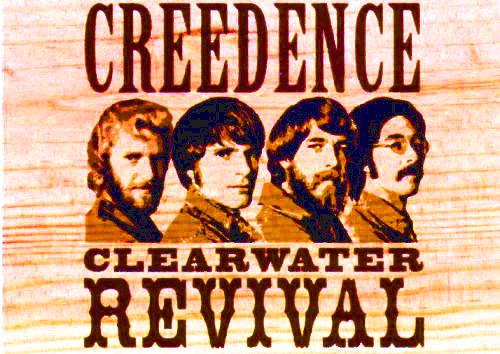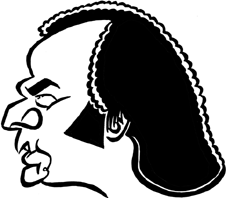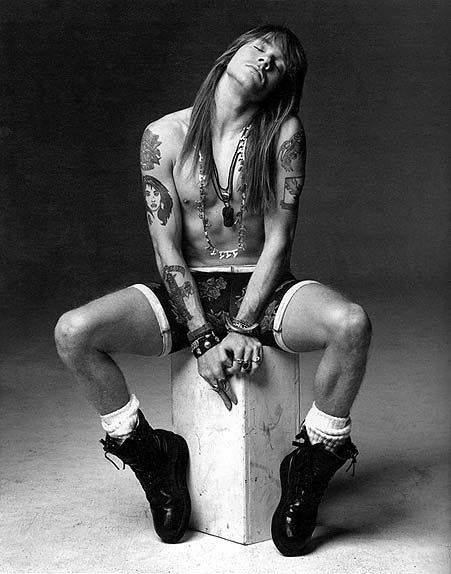
Growing up as a kid in the sixties -- with so much great music being produced in the golden age of rock and roll experimentation that it was -- there are still just a handful of bands that I can say directly impacted me in the sort of way that would have a profound effect on who I eventually became as an adult.
The Beatles would almost certainly top that list. Seeing them on the Ed Sullivan Show at the age of seven years old, blew my young mind in such a way that it gave birth to a life long obsession with music. In other words, I was pretty much ruined for life.
Three short years later, they did it again when Sgt. Pepper forced me to abandon my brief pre-teen flirtations with the "bubblegum" pop of groups like the Monkees, and take a deeper look at what more "serious" artists like Bob Dylan (yeah, he's in there too) and the various psychedelic bands of the day were saying in their music.
Unlikely as they might seem, Creedence Clearwater Revival were one of those bands. They were right in there as a matter of fact.
I only use the word "unlikely," because at the time Creedence were in many ways more of a "singles band." At least they were when compared to the other acid rock groups who came out of San Francisco at the time like the Airplane, the Dead, and Big Brother. They garnered the same sort of respect as those other bands -- at first anyway. But unlike them, Creedence's primary medium was the three or four minute single, rather than the full-length album.
Of course CCR's longer songs, like Bayou Country's seven minute "Keep On Chooglin," got played on the progressive FM rock stations just like the Jefferson Airplane and Cream did. But over the course of three brief years from 1968 to 1971, Creedence also pretty much ruled top forty AM radio. They had an unstoppable string of hit singles from "Proud Mary" right on through to "Hey Tonight" and "Have You Ever Seen The Rain" from their final album, 1971's Pendulum.
Oh, and one other thing. Although he would only be recognized as such decades after the fact, John Fogerty was writing some of the best and most defining and enduring songs of that, or any other era during those years in the sixties with Creedence.
My first exposure to Creedence Clearwater Revival came in 1968.

My father's military career had just relocated our family from a rural town in Washington State to the island of Oahu in Hawaii. There would be much culture shock in store over the next two years we lived there, dropped from a small town into the multi-racial microcosm of the islands -- at the tail end of the sixties I might add -- as we were.
As a pre-teenager about to enter junior high in Hawaii, the first shot in that cultural upheaval came on the radio. There was an AM station there called KKUA that was formatted like most top forty stations, except they placed an emphasis on "heavy groups" like the Airplane and Iron Butterfly, over the bubblegum pop I was used to hearing on Seattle's KJR. The first song I heard on KKUA was all eight minutes of Creedence's "Suzie Q."
They also played "I Put A Spell On You" from Creedence's first album, which I ended up buying. Both we're psychedelicized remakes of songs by a guy named Screaming Jay Hawkins who I'd learn more about as I got older.
It was these two songs that set the tone for the album's gritty feel of a darker, bluesier sort of take on the acid-rock that was so much in vogue at the time. Another highlight of the album was another non-original song, Wilson Pickett and Steve Cropper's "Ninety Nine And A Half." Fogerty's songs weren't center stage for this band yet. But that would all change soon enough.

By the time of Creedence's second album Bayou Country later that same year, the band had changed nearly as much as I had. In my case, I'd taken up with a group of the other "hippie kids" I'd gotten to know, and began doing things like skipping school and smoking both cigarettes and other things. For Creedence, the band had grown into a much tighter, confident sounding group and John Fogerty's original songs were now front and center where they belonged.
Outside of Fogerty's songwriting itself, the thing that was, and is still most amazing about Bayou Country was the sound. These guys were from the Bay Area, but you'd never know it hearing the deep cajun feel of songs like "Born On The Bayou." Fogerty's guitar tone to this day remains something that can only described as, well, "swampy."
There's nothing fancy about it, yet it still immediately summons dark images of the deep south. Taken together with Fogerty's unique voice -- which is basically equal parts bluesy drawl and twangy wail -- the whole thing percolates like that particular region's finest tasting gumbo. There's nothing remotely suggesting late sixties San Francisco about it.
That alone would be enough, but on songs like his first great single, "Proud Mary," Fogerty matches those images of the deep south with his words.
With it's lyrical images of "big wheels that keep on turning," "riverboat queens," and above all, "rolling on the river," Mark Twain himself couldn't paint a much more descriptive picture. The thing is, that great song would prove to be but the tip of the iceberg when it came to Fogerty's knack for writing unforgettable songs in the same way, and with the same frequency, that you or I might change our socks.

Indeed, the great songs kept coming on 1969's Green River. Many believe Creedence's third album to be their best, although that spot changes for me almost as often I change my own...well, you know. But there is simply no denying that title track, where against all odds of probability, Fogerty's guitar actually outswamps some of the songs on Bayou Country.
Released as a double A side single with "Commotion," the two songs together kick Green River off with an unstoppable one-two punch. Where "Green River" is still anchor deep in the Mississippi swamp, "Commotion" chugs along with a twang that owes as much to the country of Johnny Cash as it does to the rock of Chuck Berry. Likewise, "Lodi" brings to mind what Hank Williams Sr. might sound like backed by the Tennessee Three.
But on Green River, Fogerty's lyrics were also branching out from the riverboat themes into the broader arena of social concerns. "Bad Moon Rising," would in fact foreshadow such still to come songs as "Who'll Stop The Rain" and "Fortunate Son."
On "Bad Moon Rising," Fogerty weds the darker images of the swamp with those very concerns in lines like "I see a bad moon rising, I see trouble on the way." Although the lyric seemed ambiguous at the time, there is little doubt what he meant when taken in retrospect. Elsewhere on this great album, Creedence offers up takes on dixieland and gospel ("The Night Time Is The Right Time") and blues based rock ("Tombstone Shadow").

Creedence's fourth album, Willie And The Poor Boys came just a few months later. On it's surface, Willie represented a return to the band's more bluesy roots with Creedence adopting the alter-ego of the band singing "Down On The Corner", and scoring yet another hit in the process. Most of this record is steeped deeper than ever in the music of the deep south, as titles like "Cotton Fields" and "Poorboy Shuffle," and a very down home sounding cover of "Midnight Special" certainly bear witness.
But Fogerty's songwriting also continued it's political left turn, with his most blantantly antiwar song yet in "Fortunate Son." Of the six Creedence albums, Willie And The Poor Boys is their most obvious homage to the southern based musical traditions it was by now so obvious that the band had adopted as their own.
Taking a break (at least by the prolific standard they had established), Creedence didn't return until nine months later with 1970's Cosmos Factory. The band's fifth album in about two years, it would also prove to be their biggest, and some would say, their best.

The album's centerpiece is a stunning eleven minute plus reinvention of Marvin Gaye's "I Heard It Through The Grapevine," that features several extended guitar solos where Fogerty stretches out like he hadn't done since way back on Bayou Country roughly two years prior.
The album was also deeper than ever in singles, including the rock and roll rave ups "Travellin Band," and "Up Around The Bend," as well as more of Fogerty's emerging politically themed songs in "Who'll Stop The Rain," "Run Through The Jungle," and "Long As I Can See The Light." Cut for cut, Cosmo's Factory is almost a greatest hits record unto itself.
Creedence's final record before splintering apart when John Fogerty's brother Tom left the group (triggering a sibling feud that continued right on up to his death), Pendulum is also the group's most often dismissed record. This is probably due more to the fact that Cosmo's Factory was such a hard act to follow than anything else. Repeated listens reveal that Pendulum deserves better.

Unlike Cosmo's track listing of wall to wall hits, Pendulum contained "only" two singles. Where "Hey Tonight" was a countrified rocker recalling earlier singles like "Down On The Corner," "Have You Ever Seen The Rain" sounds almost like the answer to "Who'll Stop The Rain." It also remains one of Fogerty's best pop songs, with its hopeful lyrics of optimism providing an escapist's outlook even as the world situation was growing more and more chaotic.
John Fogerty is of course nowhere near as prolific today as he was once was, although his solo work also contains its fair share of gems, including baseball's unofficial theme song "Centerfield" and the anti-Bush themed "Deja Vu All Over Again" (which is essentially a rewrite of "Who'll Stop The Rain').
This Tuesday, Concord Music and Fantasy Records (who Fogerty made an unexpected peace with a few years back, after decades of legal wrangling) is reissuing all six of Creedence's original albums in new remastered editions with bonus unreleased tracks.

Each album comes in a nicely done eco-correct fold out package, featuring new liner notes by some of music's best journalists including Dave Marsh, Robert Christgau, and the San Francisco Chronicle's Joel Selvin. The liner notes in of themselves are fascinating to read, as they reveal some little known details about things like Creedence's split, including the involvement of notorious Beatles villain Allen Klein.
But its the extras that are the real treat here. Each of the six new discs include such rarities as live recordings of songs like "Susie Q," "Proud Mary," and "Fortunate Son", alternate takes including "Down On The Corner" and "Born On The Bayou" with Booker T and The MGs, and even CCR's odd homage to the Beatles "Revolution #9" ("Revolutions Per Minute Parts 1 & 2").
The remastered versions of Creedence Clearwater Revival's entire history making, record breaking catalog will be in stores on September 30.





















